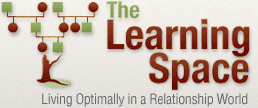The Learning Space Blog
The Thing In the Bushes: From a Focus on the Individual to an Awareness of the Family as a System
Not until looking back did I realize how Lancelot Law Whyte’s writing (The Unconscious Before Freud) had
influenced my formulation of increasing awareness as the major thrust of evolution.
John B. Calhoun, Ph.D. (March 31, 1973)
Increasing Knowledge of Social Behavior
If you are curious about human behavior, you too may stumble onto the same questions and even the same kinds of problems that plagued our ancestors. We all have our reasons to pursue knowledge. It happened for me, after my younger brother was hospitalized. This marked the beginning of my curiosity about what “the people in psychiatry” know. What made them say the things they said about my brother? Would I believe what they said?
In answering these questions I got to know generations of researchers focusing on describing different parts of human behavior. Remember the parable of the blind men. They thought they were describing the elephant, when in fact all they could describe was what they could feel, only a part of the whole. They were unable to see the whole. Human behavior is as difficult to see as the elephant was to the blind men. Human behavior is a thing hiding in the bush. It is all around us and in us. We feel it but we cannot either see it very well or describe it well enough to know it.
Psychologically blind but curious, in 1975 I began a job at a psychiatric hospital. Here I had the opportunity to learn through experience. I listened to the patient’s stories, listened to team diagnosis and treatment plans, and had access to the hospital’s library. The relationships between the patient and the staff seemed very similar to a family of teenagers. The staff were the parents and the patient needed to behave.
It was in the library that I found the work of the early investigators of human behavior. I noted how many theories arose out of listening to clients and observing relationships in the psychotherapy hour. I began to see all the various theories as best guesses, as what I believe were the therapists’ hopes, little fallacies and assumptions. Wanting to build a knowledgeable base for managing myself, I could not accept on faith all that was held to be true. I had to weed through the various ways of thinking about mental illness, think these ideas through and try things out for myself.
As noted in the first chapter, the evidence suggesting that our brains are automatically tuned to react to people and situations is staggering. By considering briefly the long history of psychiatry, I began to see that even the geniuses in the field faced difficulty moving from a focus on the individual’s mind as the “pathology” to taking a giant leap forward to understanding the influence of family relationships over generations in shaping any individual’s current behavior.
The interactional world of the family was and still is difficult to see. Perhaps the thing in the bush, human behavior, can only be seen after all the other explanations are thoroughly explored and rejected ... read more and leave your comments...
Filed under Bowen family systems theory
Comments are closed for this post.
Blog Categories
Blog Archive
- June 2019
- December 2018
- October 2018
- June 2017
- February 2017
- July 2016
- February 2016
- November 2015
- August 2015
- June 2015
- April 2015
- February 2015
- December 2014
- October 2014
- September 2014
- August 2014
- July 2014
- June 2014
- May 2014
- April 2014
- March 2014
- December 2013
- October 2013
- August 2013
- July 2013
- June 2013
- April 2013
- February 2013
- January 2013
- December 2012
- August 2012
- July 2012
- June 2012
- March 2012
- February 2012
- January 2012
- December 2011
- November 2011
- October 2011
- September 2011
- August 2011
- July 2011
- June 2011
- May 2011
- March 2011
- January 2011
- December 2010
- November 2010
- October 2010
- September 2010
- May 2010
About the Learning Space
"The Learning Space is a creative, energetic thinking space for individuals striving to live optimally in all their most important relationships. The Learning Space provides a conceptual space—a place to consider and experience alternate ways of relating."
Read More »
Upcoming Events
view events »Newsletter
Fill out the form below to subscribe to The Learning Space's quarterly newsletter, and get exclusive invitations to special learning forums and other events.

